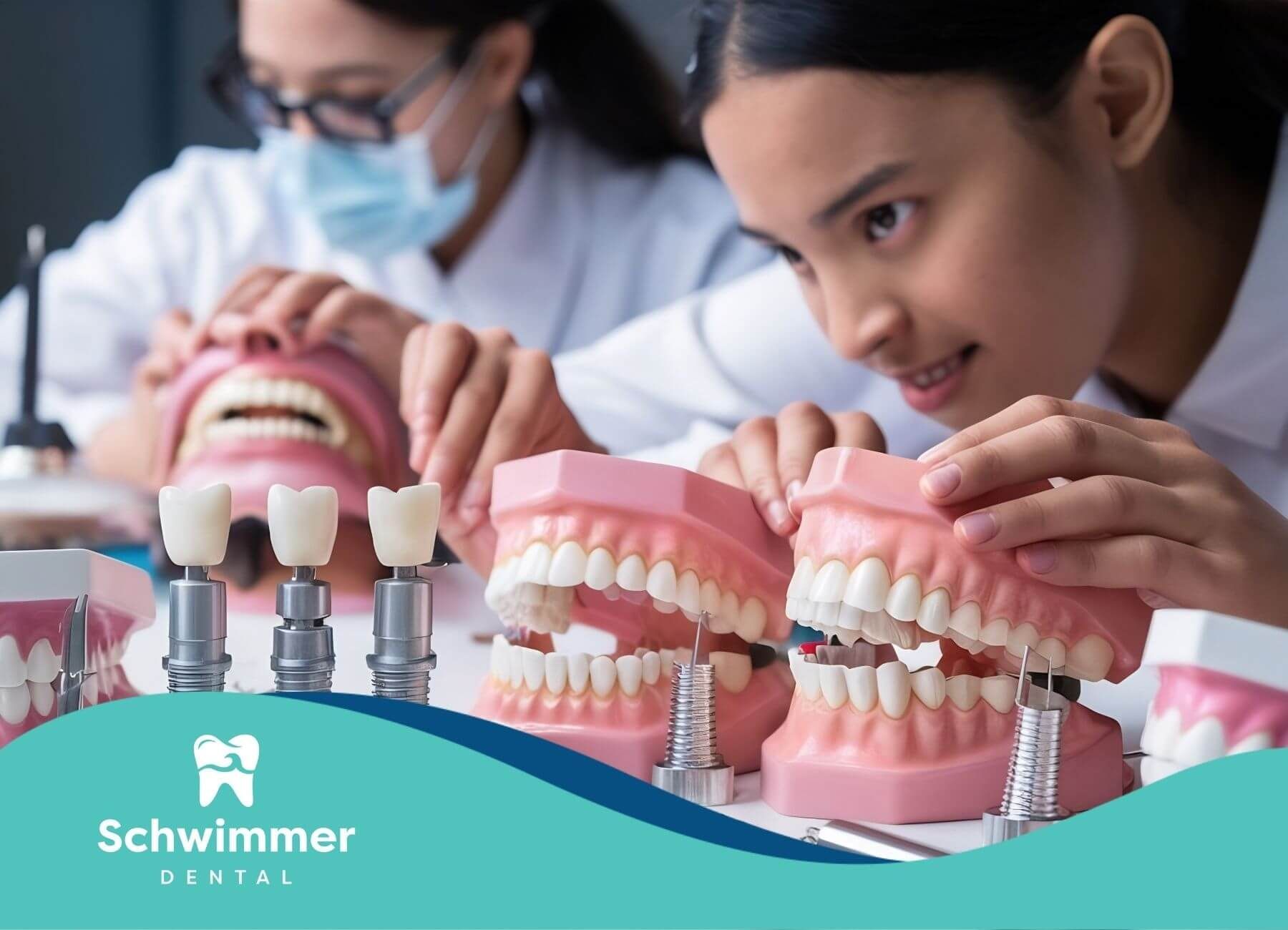Top 5 Indicators You May Need Dental Implants Soon
Key Highlights
- Dental implants are a modern solution for missing teeth and provide a stable foundation for tooth replacement options.
- Experiencing tooth loss or struggling with loose dentures can lead to oral health issues and affect your quality of life.
- Signs like difficulty chewing, jawbone changes, or persistent tooth pain might indicate the need for a dental implant procedure.
- Restoring natural teeth functionality can improve your ability to eat, speak, and smile confidently.
- Timely dental intervention ensures better overall oral hygiene, bone health, and a youthful facial appearance.
Losing a tooth can be a frustrating experience, but the good news is that you don’t have to live with the consequences forever. As a dentist in NJ, I’ve helped many patients restore their smiles with dental implants.
In this post, I’ll walk you through the 10 key signs that suggest it’s time to consider dental implants, helping you make an informed decision about your oral health.
Key Signs You Should Consider Dental Implants Soon
If you find yourself struggling with everyday activities like chewing, speaking, or even smiling, it's possible that you’re dealing with more than just aesthetic concerns.
Tooth loss or damage often leads to bigger oral health issues that, if not addressed, can affect your quality of life. Dental implants can help restore functionality, comfort, and confidence.
Here are 10 signs that it might be time to consult a professional about implants.
1. Missing One or More Teeth
Losing a tooth isn’t just about a cosmetic change. It affects your bite, your speech, and even your jawbone health. If you've lost a tooth, even if it's not visible, it can cause the surrounding teeth to shift into the gap, leading to misalignment and bite problems.
According to the American Dental Association (ADA), when a tooth is lost, the adjacent teeth can begin to shift, affecting bite alignment. If left untreated, this can cause additional dental issues, including tooth wear, jaw strain, and gum disease. Dental implants are a reliable way to replace missing teeth and prevent these long-term effects.
I remember a patient of mine, Sally, who lost a tooth due to gum disease. She didn’t think much of it at first, but over time, her teeth started shifting, causing her bite to worsen. By the time she came to me, her ability to chew had also been compromised.
This situation could have been avoided with early intervention. Dental implants are an excellent way to replace missing teeth and maintain your jaw's integrity. Implants help stimulate the jawbone, preventing bone loss and maintaining facial structure.
2. Struggling with Loose or Unstable Dentures
Loose dentures can make everyday activities, like eating and speaking, a frustrating challenge. If you're constantly worrying about your dentures slipping or need to apply adhesives just to keep them in place, it's time to explore dental implants.
Unlike traditional dentures, dental implants provide a secure and lasting solution. Implants are anchored directly into the jawbone, offering stability and reducing discomfort.
According to the National Institute of Dental and Craniofacial Research (NIDCR), implant-supported dentures have a success rate of over 95%, making them a superior choice to traditional dentures for many patients.
One of my patients, John, was tired of his dentures slipping during meals. After switching to implants, he told me he felt like he had his real teeth back. He could enjoy meals without worrying about his dentures moving around.
3. Difficulty Chewing or Biting Certain Foods
Have you found yourself avoiding certain foods because they’re too difficult to chew? This could be a sign that your teeth aren’t functioning properly. Whether it’s due to tooth decay, damage, or misalignment, having trouble chewing can limit your diet and lead to nutritional problems.
Dental implants work like natural teeth, allowing you to chew comfortably again. According to a study published in the Journal of Prosthetic Dentistry, dental implants significantly improve the ability to chew compared to traditional dentures, leading to better overall nutrition.
One of my patients, Linda, had difficulty enjoying fruits and vegetables because they were too tough to bite into. After receiving dental implants, she was thrilled to eat a wider range of foods again, and her overall health improved.
If you’re struggling with chewing, implants could help restore the function of your teeth and allow you to enjoy your meals once more.
4. Experiencing Jawbone Loss or Changes in Facial Shape
Have you noticed any changes in the appearance of your face? Jawbone loss, often caused by missing teeth, can lead to a sunken or aged look. This happens because when you lose a tooth, the jawbone begins to deteriorate due to lack of stimulation.
Dental implants act as a substitute for tooth roots, stimulating the jawbone and preventing bone loss. According to the ADA, implants are the only tooth replacement option that helps preserve bone density and facial appearance.
I once treated a patient, Mark, who had been missing several teeth for years. Over time, his jawbone had shrunk, giving his face an older appearance. After receiving implants, the change was remarkable. His facial structure became more defined, and he looked and felt years younger.
5. Persistent Tooth Pain or Severe Decay
Tooth pain can be a sign of infection or decay. If you’re experiencing persistent discomfort in one of your teeth, it might be too far gone for restoration with a filling or crown. In some cases, the tooth may need to be extracted and replaced with an implant.
When severe decay or infection is left untreated, it can spread, leading to more serious oral health problems. A study from the American Academy of Implant Dentistry (AAID) shows that dental implants provide an effective solution for damaged teeth that cannot be saved with other restorative treatments, reducing the risk of further complications.
I had a patient, Daniel, who ignored a painful tooth for months. Eventually, the infection spread to other teeth, and the only solution was to remove the affected tooth and replace it with an implant. If you’re experiencing pain, don't wait—consult a dentist as soon as possible to explore your options for treatment.
Conclusion
Recognizing the signs that you might need dental implants is crucial for your oral health and overall well-being. If you’re missing teeth, struggling with dentures, or facing challenges like jawbone loss or tooth pain, it may be time to consider implants.
At Schwimmer Dental, we specialize in providing high-quality dental implants that look, feel, and function just like your natural teeth. Don’t let missing teeth or discomfort hold you back—schedule a consultation with us today to learn more about how dental implants can improve your life.
We’re here to answer all your questions and help you achieve the smile you deserve.
Frequently Asked Questions
What are dental implants and how do they work?
Dental implants act like an artificial tooth root. They are usually made from titanium. The implants get placed in the jawbone, where they go through a healing process and fuse with the bone. This helps give a strong base for tooth replacement, like a crown or other false teeth. The dentistry process lets you get back the look and use of natural teeth, so they both act and look just like your own.
How long do dental implants typically last?
With good oral hygiene and the right dental care, dental implants can last many years. The implants are made with titanium, so they are durable and strong. The crowns on top are built to handle daily use and last a long time. If you visit your dentist often and follow instructions after surgery, the healing process goes smoothly. This care helps keep the performance of your dental implants at its best.
Are dental implants suitable for everyone?
Not everyone can get dental implants. To have implants put in, you need to have healthy teeth and gums. You also need enough bone in your jaw. A dentist will look at your oral health during the consultation. They will check if you have any bone loss before saying if implants are right for you.
Sources:
https://www.ncbi.nlm.nih.gov/books/NBK470448/
https://www.mayoclinic.org/tests-procedures/dental-implant-surgery/about/pac-20384622
https://www.perio.org/for-patients/periodontal-treatments-and-procedures/dental-implant-procedures/
https://www.researchgate.net/publication/387200732_Selecting_a_Right_Candidate_for_Dental_Implants_Patient_Related_Risk_Factors
https://www.healthline.com/health/dental-and-oral-health/benefits-of-dental-implants



